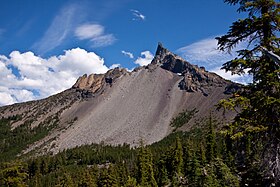Mount Thielsen
| Mount Thielsen | |
|---|---|

Mount Thielsen's eroded edifice from the Pacific Crest Trail
|
|
| Highest point | |
| Elevation | 9,184 ft (2,799 m) NAVD 88 |
| Prominence | 3,342 ft (1,019 m) |
| Listing | Oregon county high points |
| Coordinates | 43°09′10″N 122°03′59″W / 43.152837292°N 122.066514283°WCoordinates: 43°09′10″N 122°03′59″W / 43.152837292°N 122.066514283°W |
| Geography | |
| Location |
|
| Parent range | Cascades |
| Topo map | USGS Mount Thielsen |
| Geology | |
| Age of rock | About 290,000 years |
| Mountain type | Shield volcano |
| Volcanic arc | Cascade Volcanic Arc |
| Climbing | |
| First ascent | 1883 by E. E. Hayden |
| Easiest route | Scramble |
Mount Thielsen, or Big Cowhorn (Klamath: hisc’akwaleeʔas), is an extinct shield volcano in the Oregon High Cascades, near Mount Bailey. Because eruptive activity ceased 250,000 years ago, glaciers have heavily eroded the volcano's structure, creating precipitous slopes and a horn-like peak. The spire-like shape of Thielsen attracts lightning strikes and creates fulgurite, an unusual mineral. The prominent horn forms a centerpiece for the Mount Thielsen Wilderness, a reserve for recreational activities such as skiing and hiking.
Thielsen was produced by subduction of the Juan de Fuca Plate under the North American Plate. Volcanism near the Cascades dates back to 55 million years ago (mya), and extends from British Columbia to California. Thielsen is part of the High Cascades, a branch of the main Cascades range that includes Oregonian volcanoes less than 3.5 million years old; it is also a member of a group of extinct volcanoes distinguished by their sharp peaks.
The area surrounding the volcano was originally inhabited by Chinook Native Americans, and was later encountered by Polish settlers. One of the visitors was Jon Hurlburt, an early explorer of the area who named the volcano after the engineer Hans Thielsen. Later explorers discovered nearby Crater Lake. The volcano was not analyzed until 1884, when a team from the United States Geological Survey sampled its fulgurite deposits.
The area was originally inhabited by Chinook Native Americans, who referred to the mountain as "Hischokwolas"; the Klamath call it "hisc'akwaleeas". Jon Hurlburt, a Polish explorer, renamed the volcano after Hans Thielsen, a railroad engineer and builder who played a major role in the construction of the California and Oregon Railroad.
...
Wikipedia

